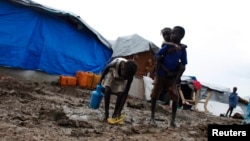The International Organization for Migration (IOM) says aid agencies are racing to cope with the rapid influx of thousands of internally displaced South Sudanese at a U.N. compound in Malakal, Upper Nile State.
Since mid-July, more than 16,000 people have fled to the U.N. site in Malakal for protection and assistance. Nearly 10,700 have arrived since August 1. IOM spokesman, Joel Millman told VOA the heavy influx of new arrivals is creating a chaotic and untenable situation for both the displaced and the aid agencies trying to help them.
Millman noted the camp, which was designed for 18,000, now houses 46,500 internally displaced. And, this number, he said is rapidly rising as almost 1,000 new people are arriving every day.
“So, we can imagine that tents are overcrowded, that the passageways between tents are being filled with sort of impromptu settlements, that sanitation is now a huge concern because people relieve themselves very close to their drinking water supply, which we have to maintain in some manner,” Millman said.
Bracing for impending rains
In addition to these already challenging conditions, Millman said aid agencies now have to cope with impending rains. He said this will worsen the already desperate living conditions in the improvised settlements and make it more difficult to provide assistance.
He said IOM is doing what it can to provide services to new arrivals. But, he said the current influx is unprecedented and the heavy rains together with increasing congestion are adding to the collective misery.
Millman said the U.N. Mission in South Sudan and humanitarian agencies are working to provide additional space to shelter families in dry areas. But, he said this will not solve the problem of overcrowding.
“The more we build, the faster people come for shelter. We cannot separate families. We cannot turn them away. On the other hand, we cannot expose them to what could be extremely dangerous health conditions. If you do not do proper drainage, what diseases are you attracting? Can you have a new tent city that becomes a flooded tent city and how do you deliver to that?“ he said.
Millman said operations are underway to provide safe drinking water and sanitation. He added IOM is digging emergency pit latrines, though not enough to meet demand.
Humanitarian agencies have been unable to provide aid to communities in areas surrounding Malakal for months because of the conflict, which is behind much of the current exodus. To stem the flow of new arrivals into Malakal, the agencies agree they must be allowed to distribute relief immediately to these underserved populations.





